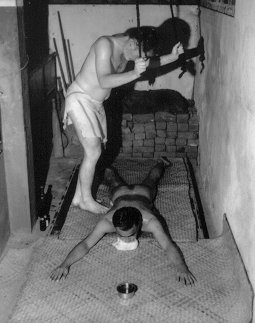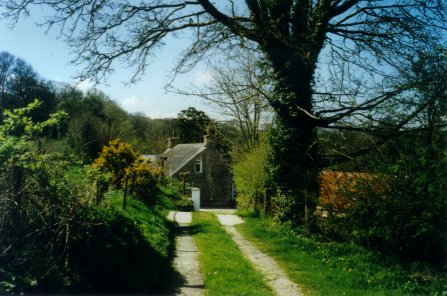
|
| Northern Style emphasizes repetition of basic psychophysiological forms closely related to yoga, and including: animal poses (vadivu); leg kicks (kal etupp); combined bodymind exercises (meippayattu); the kalari vanakkam (salutation to the deities with the body); and (in intermediate/advanced courses) weapons practice (long-staff, short stick, otta, dagger, sword and shield, spear, mace). |  |
Southern Style emphasizes empty hand forms and techniques for basic self defence training and bodymind coordination. It includes more upright stances, and students learning this style are immediately involved in attacking and/or defending in four basic directions. [For those interested in studying this style, they should contact John Cassie (see below) who teaches in the London area.]
 Massage and Treatments
Massage and Treatments
Kalarippayattu’s special full-body massage is also regularly offered, especially during residential courses in West Wales. Given with the feet while holding onto ropes suspended from the ceiling, this is a very intensive and deep form of massage which stimulates the interior subtle body (as defined by yoga), clears the interior "channels" (nadi), and helps unlock the "serpent energy" (kundalini sakti) within. The massage is given for at least three days, but more typically and beneficially for periods of five, seven, or fourteen days. Those who undergo the massage must be continuing students dedicated to ongoing study of the art, and be in excellent physical condition. A less strenuous ‘general health’ form of massage, or a hand-massage is also available.
HATHA YOGA
Emphasizing work with the breath and focus, basic yoga asanas and yoga stretching provide a consistent and excellent warm-up prior to practicing kalarippayattu in cold climates.
 TAI
CHI CH’UAN
TAI
CHI CH’UAN
Short form of the Chinese martial art, Wu style t’ai chi ch’uan, emphasizes coordination of breath with movement, centering, balance, and subtle use of energy. The full form is only taught during extended training in a long-term course of study. Workshops often make use of the beginning form as a part of preliminary training for awareness and use of breath. In longer-term training the full form can be taught. The total short-form lasts approximately 15-20 minutes.
Recent FEEDBACK FROM PARTICIPANTS
"a wonderful opportunity
to be taught by an individual whose knowledge and
enthusiasm is an inspiration"
London, IWF
2000
"the emphasis on psychophysical
training linked to the breath has given me a
key to understanding my own process as a performer that will inform and
enrich my further work"
London, IWF
2000
"fantastic, inspiring,
and encouraging"
London, IWF
2000
 1.
Tyn-y-parc Kalari, Llanarth, Wales. A permanent, residential
traditional kalari (place of training) inaugurated July, 2001, with a
traditional pounded earth floor. [Click on The West Wales
Kalari/Studio for more.]
1.
Tyn-y-parc Kalari, Llanarth, Wales. A permanent, residential
traditional kalari (place of training) inaugurated July, 2001, with a
traditional pounded earth floor. [Click on The West Wales
Kalari/Studio for more.]
2. London workshop/classes.
Occasional workshops. Weekly classes soon to be restarted. Contact Phillip Zarrilli
for more information.
When offered, weekly classes cost £8.50 sterling per class (£6.50
concession)
Also, contact John Cassie about his style of Northern kalarippayattu, or central and southern styles: malabarjohn@yahoo.co.uk, (0207-6033987).
3. Regional Courses/Centres in the UK. Regional centres and courses of study are either established or in planning for Huddersfield, Glasgow, and Exeter, among others.
4. Europe: Beginning in January, 2001 with a five day intensive beginners course, an ongoing group has been established in Graz, Austria under the leadership of Klaus Seewald. Phillip Zarrilli will return as often as possible to Graz to teach beginning and advanced classes. For information about Graz, contact Klaus Seewald as follows:
email: klaus.seewald@gmx.at
Office: A-8011 Graz, Postfach
932
Telephone: 43/(0)699/17 57
63 95
INSTRUCTOR:
PHILLIP B. ZARRILLI is the first Westerner to have undergone full-time, long-term training in kalarippayattu. Since he began his training in 1976 at the C.V.N. Kalari, Thiruvananthapuram, Kerala, South India under Gurukkal Govindankutty Nayar, he lived in Kerala for seven years, and continues to return regularly. In 1988 he received the traditional pitham (stool representing past masters) from Govindankutty Nayar. He also trained at the Kerala Kalarippayattu Academy, Kannur, with C. Mohammed Sherif Gurukkal, and under Sreejayan Gurukkal and Raju Asan. He studied Yoga with Chandran Gurukkal in Kannur and Dhayaniddhi in Thiruvananthapuram. He specializes in northern style kalarippayattu, full-body massage (uliccil), and complimentary yoga. He trained in t'ai chi ch'uan (Wu-style) with noted theatre director and East Asian scholar, A.C.Scott. He has conducted workshops, "Making the body all eyes..." throughout the world, including Esalen Institute, Utrecht School of the Arts, Passe Partout, National School of Drama (New Delhi), Centre for Performance Research (Wales), (London) International Workshop Festival, Gardzienice Theatre (Poland), among others. For over twenty years he was Director of the Asian-Experimental Theatre Program in the U.S.A. where he taught classes daily. He now lives between Exeter in south-west England and Llanarth, West Wales. He regularly directs theatrical productions with actors he has trained including recent highly acclaimed productions of Samuel Beckett's plays with Theatre Asou (Graz, Austria, 1999), and at the Grove Theatre Centre, Los Angeles (2000, and forthcoming). He is the author of numerous essays and books on kalarippayattu and other traditional arts of Kerala, and his comprehensive study of the martial art, "When the Body Becomes All Eyes:" Paradigms, Practices, and Discourses of Power in Kalarippayattu was published by Oxford University Press (1998; paperback 2nd edition, 2000) is available through any bookstore. He has also written widely on acting and performance, including publication of Acting (Re)Considered: Theories and Practices (Routledge Press, 1995), and in writing a book on his own approach to actor training, Acting..."at the nerve ends:" A Psychophysical Approach. He is Professor of Theatre/Performance at Exeter University where he integrates his teaching of martial/meditation arts for performers into the curricula for the B.A., M.A. (Theatre Practice), and Ph.D. degrees. [For information about these courses of study at Exeter, and how they integrate martial arts into degree courses, please contact Phillip Zarrilli.]
[JOHN CASSIE teaches regularly in the London area, and will occasionally conduct workshops of his own in West Wales. He teaches a slightly different style of Northern kalarippayattu, as well as Central and Southern styles. He has studied kalarippayattu under C. Mohammed Sherif Gurukkal at the Kerala Kalarippayattu Academy since 1990. He is a certified instructor in Northern, Central, and Southern styles of Kalarippayattu, in Siddha Mura Yoga, and massage. John is also a licensed Practitioner of NLP and a registered Stress Management Consultant with the International Stress Management Association (ISMA).]
FOR FURTHER INFORMATION CONTACT:
Phillip Zarrilli (P.Zarrilli@exeter.ac.uk)
Wales: (44)-01545-580376
Exeter: (44)-01392-427688
Mobile: 07790864314
Permanent Kalari/Studio Address:
Tyn-y-parc Llanarth, Ceredigion SA4 70PB Wales, U.K.
OR (except July/August): University of Exeter Department of Drama Thornlea New
North Rd. Exeter EX4 4LA, UK (44-01392-724580)
John Cassie
London: (44) 0207-6033987
Ground Floor
2 Melrose Gardens
London W6 7RW
email: malabarjohn@yahoo.co.uk